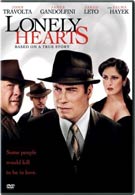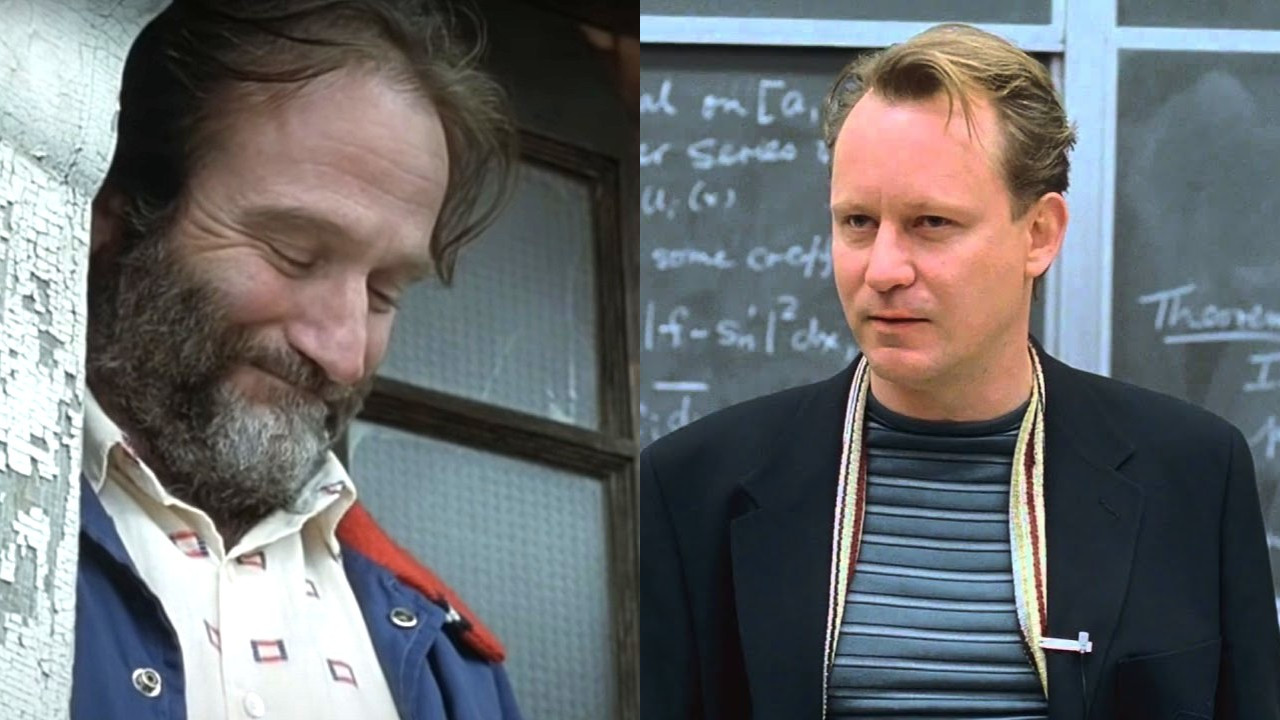When I think about a movie about two psychopaths with a passion for hot-blooded sex and cold-blooded murder, I immediately think of Natural Born Killers. Unfortunately, this is a review for Lonely Hearts, which, in comparison, is more like Harold and Maude with guns and two slightly less creepy people in the title roles. Lonely Hearts is based on the true story of Raymond Fernandez (Jared Leto) and Martha Beck (Salma Hayek), notoriously known as the "Lonely Heart Killers" in the late 1940s. The duo would place ads in singles magazines and prey on lonely women, mostly lovelorn war widows, whom they would swindle and later kill. The bizarre couple, who “worked” as brother and sister in their schemes, left a trail of about 20 bodies from Long Island to Michigan. The movie decides to focus on the two homicide detectives, Elmer C. Robinson (John Travolta) and Charles Hildebrandt (James Gandolfini), who are chasing the killers, which makes for a rather dull, unfocused story, although it is understandable why the writer and director of this film, Todd Robinson, chose to tell this story the way he does: Elmer C. Robinson was his grandfather.
It’s admirable that the director wanted to pay homage to his grandfather’s work catching killers running rampant around the country, but he should have kept in mind that people have to watch the film and be entertained by it. It’s not like he was short on talent to make sure that happened. This is an A-list cast led by Travolta, Gandolfini as well as Salma Hayek, Jared Leto, Laura Dern and Scott Caan. Unfortunately, they were stuck with a script that should have been nothing more than a B-movie.
Travolta gives a strong performance as a hard-working but troubled detective obsessed with solving the Lonely Hearts case. Robinson is all about the job and very little outside of catching “bad guys” matters to him. The film briefly touches on the strained relationship with his teenage son, Eddie (Dan Byrd), caused by a mother that walked out on the family years before, but it’s not a part of the story we’re forced to care about, even though we’re watching a movie that is focused on the man chasing two criminals. All we know about his personal life is that he is “banging” (as is said in the film) Rene Fodie (Dern), and his son doesn’t like it. Why? Who knows? For such an important character, that the director cares so much about, all we know is that he is a fairly introverted person that does great detective work.
Gandolfini plays Travolta’s partner, Hildebrandt , and finally finds himself in a role that places him on the other side of the law. For me, it’s hard to watch Gandolfini in this film and not want him to start whacking Travolta over the head with a frying pan after deciding not to partake in a weekly poker night with the other guys from the force. It is literally like watching Tony Soprano become a part of the police force. It’s just that every time he sits down at his desk, I expect Paulie Walnuts to come running in with a sausage and peppers hero. His mannerisms, accent, and facial expressions are no different than they were playing a New Jersey mob boss and, for me, it took away from a solid performance. He, along with Caan, provide some comic relief, but their jokes are often crude and their childish fights are merely a distraction from the focus of the film.
My biggest gripe with the film is the miscasting of Hayek as Beck. Granted, she’s a beautiful woman with a lot of talent, but this role is not about beauty – it’s about cold-blooded murder. Plus, if you do any research on Beck, you learn that she was a large woman. When I say large, I mean she was between 200 and 300 pounds, and not just in the bra. Hayek does her best to act like a stone-cold killer addicted to sex, but it doesn't work.
Nothing really works for Leto either. After Fernandez meets Beck, he seems like a bumbling idiot as opposed to the smooth operator he apears to be at the beginning of the film. He turns into a bum that follows his wife’s orders, which is understandable considering he is looking at Hayek – any man would follow her orders. Beck is always in control and her husband is just along for the ride – toupee and all. It is more than an hour into the film before Leto, or Hayek for that matter, really show any sign of life, or cold-bloodedness. But, of course, that isn't the true focus of an otherwise stylishly shot film. For a couple that is addicted to sex, as advertising describes, there is little-to-no affection shown. And when there is, there is very little chemistry. Leto and Hayek make it as comfortable to watch as it would be for me to perform those acts in front of my parents.
The Lonely Heart Killers were famous for leaving a trail of about 20 or so bodies through various states. The body count at the end of the film includes three Lonely Hearts, an old man at a farm stand who they kill for a dog, a police officer, and a young girl who they stuff in a tricycle box. If my math skills have not deteriorated, that adds up to six.
Your Daily Blend of Entertainment News
Another big problem with the film is you know what’s going to happen to the two killers within the first five minutes of the film. You know that they’re going to get caught. You know that they’re going to be electrocuted. Worst of all, by telling you this, I am not ruining the film for you. There is no suspense. There is no depth to the characters. There is no real focus. Why should we care about the police work when we already know the outcome?
While Robinson, whose only directing credits before this film include documentaries and an episode of “America’s Most Wanted,” held this story close to his heart and wanted to focus on his grandfather’s police work, somewhere along the line he realized that, maybe, just maybe, he should tell the story of the murderers, too. There is a story and some very good acting in this movie, but after watching it, it’s not hard to see why the few people that saw it in theaters were lonely themselves. If there is nothing special about a movie, there is no special feature that is going to change my mind. The DVD for Lonely Hearts doesn’t do much to try and change your mind because it offers a very lonely feature: just a making-of featurette.
What’s worse than making a movie that fails to tell a story with a ton of potential? Making an 11-minute featurette about making a movie that failed to tell a story with a ton of potential. The funny thing is that parts of the featurette are actually more interesting than the movie itself. How can this be? Well, it basically points out all of the movie's faults by showing you real pictures of the crime scenes, the killers and those involved in the case. I dare you to watch the featurette and tell me that Salma Hayek, the same woman who danced on a bar wearing nothing but a snake in From Dusk ’Til Dawn, was perfect to play Martha Beck. The featurette also has those involved in making the film doing the same old song and dance routines, glorifying their remake of the 1970 film The Honeymoon Killers, and making it out to be something that it’s not.
By the way, I lied; there are more features under the “Special Features” section, only they have nothing to do with Lonely Hearts. It is almost too obvious that the makers of the film admitted that they failed to keep your attention with the feature presentation. So, since it seems there was nothing else special to give to the Lonely Hearts viewer, they show you seven other films you might care more about, including Bobby Z, The Last Time, Yellow, September Dawn, God Grew Tired of Us, The Contractor and two different cuts of Donnie Brasco. Heck, it seems as if they want you to skip the special features all together, considering one of the choices on the main menu is marked, “Previews.”
I didn’t expect much from the special feature section, but I expected some sort of effort. For a director who spoke so passionately about a story about his grandfather, you would expect a DVD filled with alternative endings, deleted scenes, or even a more in-depth history of the Lonely Heart Killers. Instead, you feel like you’re one of the people being duped by Beck and Fernandez – left with nothing in the very end.

